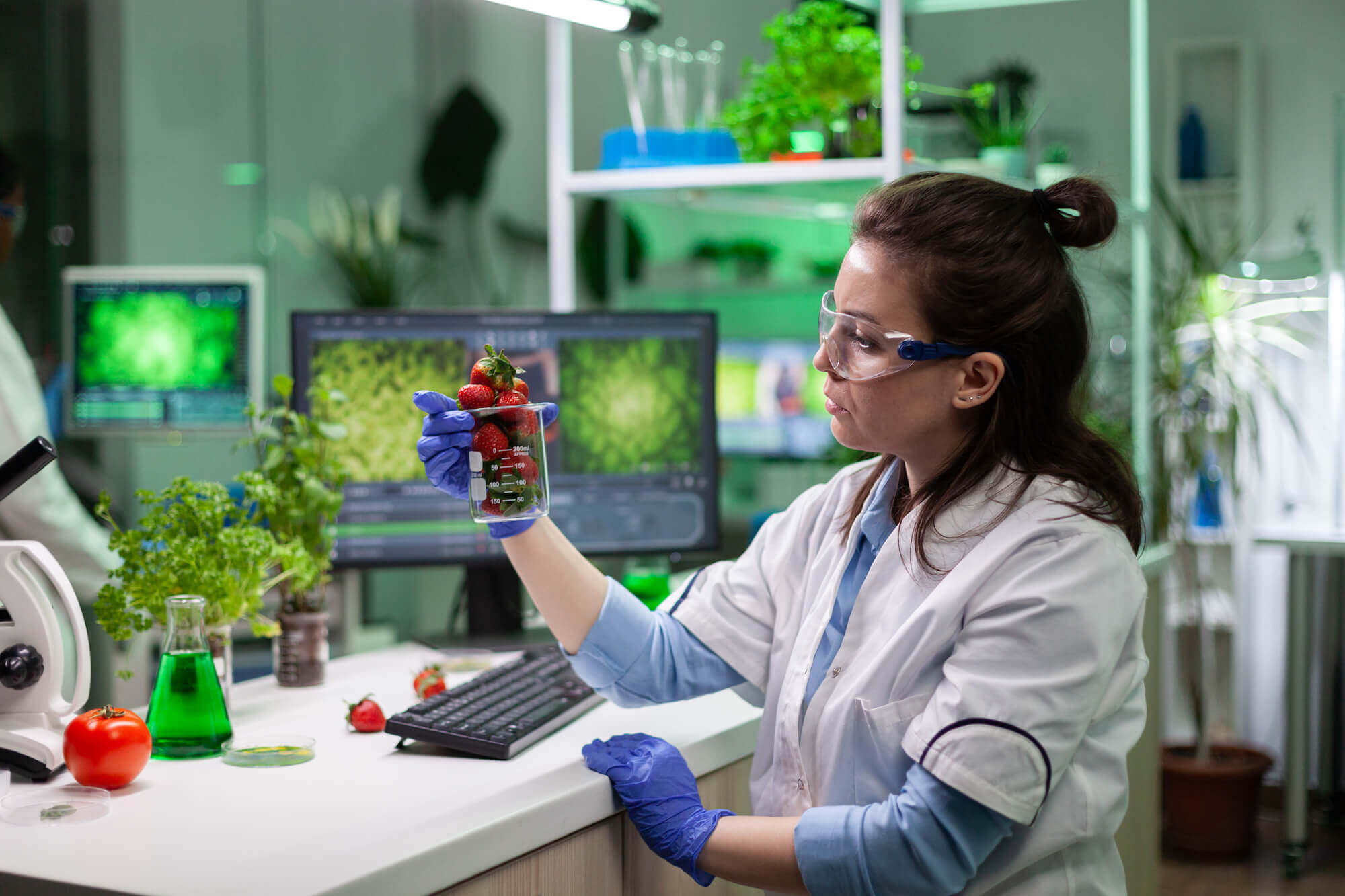Guest Post
The Truth About Biochemistry, Biotechnology, Bioengineering and Biomedical Science
POSTED ON 12/22/2023 BY Namitha Kumar

Embarking on a journey through biological sciences is like unlocking the universe’s secrets. After all, it is the study of living organisms and their environments. Biological scientist specialising in genetics, genomics, molecular cell biology, and biochemistry play a vital role in healthcare and environmental conservation, addressing global challenges like climate change. In this blog, we will demystify Biochemistry, Biotechnology, Bioengineering and Biomedical Science.
1) What is Biochemistry?
Contrary to common belief, biochemistry is not merely a science that combines biology and chemistry; rather, it delves into life’s intricate chemistry. Biochemistry, as the name suggests (where “bio” denotes life), involves examining life processes at the molecular level. It is crucial to recognise that a substantial 85 percent of biochemistry is essentially a study of chemistry. Biochemists typically study the structure, composition, and chemical reactions within living organisms. For example, they observe how the human body releases insulin from the pancreas after a meal. Biochemistry is an interdisciplinary major that covers various subjects such as molecular biology, physical biochemistry, immunochemistry, neurochemistry, and biochemical pharmacology. Its application ranges from medicine, food science and agriculture to pharmacology, toxicology and clinical chemistry.
While biochemists in academia focus on research or teaching (after a PhD), those in the industry (biotech and pharma) work on applied research or production, which leads to marketable products. Some biochemists may also choose to work in hospital and healthcare settings. According to the US Bureau of Labor Statistics, the median pay of biochemists and biophysicists is $103,810 annually, and the number of jobs in the profession is 34,500. Jobs are expected to grow at a rate of seven percent between 2022 to 2032.
Some top biochemistry programmes include Johns Hopkins University, the University of Pennsylvania, Duke University, Vanderbilt University and Georgetown University. In the UK, universities offering biochemistry programmes include the University of Oxford, University College London, University of Edinburgh, University of Manchester, Imperial College London, University of Glasgow and others.
The first year involves building on background knowledge like biology, chemistry, math, statistics and computing along with lab work and data analysis. Typical modules in biochemistry include genetics, cell biology and signaling, enzymology, metabolism, proteins, plant biochemistry, microbiology and disease mechanisms.
2) What is Biotechnology?
The Biotechnology Innovation Organization states that biotechnology is a field that uses cellular and molecular processes to improve human lives and the planet’s health. Biotechnology aims to create and develop products useful in the health, medicine, agriculture, and food industries. The breakthrough in 1978 with E. coli-produced human insulin by Eli Lilly exemplifies biotechnology’s transformative impact, offering a cleaner and more effective alternative for diabetes treatment.
Biotechnology has boomed further since the COVID-19 pandemic. The number of people working in the US life sciences industry grew 5.3 percent from January 2021 to January 2022. The estimated total pay for a Biotechnologist is $92,120 per year in the US, with an average salary of $82,446 per year. Today, biotechnology majors can specialise in medical and pharmaceutical biotechnology, industrial biotechnology, and agricultural and plant biotechnology.
Some top biotechnology programmes include Northeastern University, Pennsylvania State University, Imperial College London, University of Manchester, University of Nottingham and the University of Edinburgh. Students typically take core modules like biochemistry, cell biology, enzymes and metabolism, molecular biology, integrative biology, structural biology, genetics and genomics, bioinformatics, drug design, and synthetic biology.
3) What is Bioengineering?
People often confuse biotechnology and bioengineering, warranting the need for clarity. To quote Biotech Health, “We can say that biotechnology creates cells that will develop pharmaceutical drugs. Conversely, bioengineering develops a process to produce those drugs faster.” Bioengineering is a field that focuses on engineering principles that are applied to tissue and genetic engineering. It harnesses biological systems to improve or enhance them within the framework of biological theories.
Bioengineering encompasses various areas of study. It includes genetic and tissue engineering, addressing the rising demand for FDA-approved gene therapeutics. It also comprises Biomedical Engineering, which focuses on designing medical devices such as continuous wearable glucose monitors. Agricultural and Biosystems Engineering tackles agricultural and environmental issues by integrating mechanical and electrical engineering, food science, chemistry, and biology disciplines. Bionic Engineering, an interdisciplinary field, mimics living organisms to develop biomimetic devices for healthcare, exemplified by innovations like the cochlear implant for hearing restoration.
In “Genetic Engineering on the Rise”, the Center for Career Development at the University of Connecticut suggested that the industry would grow 15 percent in the next ten years. The median annual salary for bioengineers was $99,550 in 2022. According to UC Riverside, approximately 16 percent of bioengineers worked in medical equipment and supplies manufacturing in 2020, and another 16 percent worked in research and development in engineering and life sciences.
Some of the top undergraduate bioengineering programmes in the US include Stanford University, University of Pennsylvania and Cornell University. In the UK, students can pursue bioengineering or biomedical engineering at King’s College London, Queen Mary University of London, University of Surrey and others.
4) What is Biomedical Science?
Biomedical science, a foundational aspect of modern medicine, spans critical functions such as determining blood needs for patients, identifying infectious disease outbreaks, and monitoring cancer biomarkers. According to the Rochester Institute of Technology (RIT), “the field of biomedical sciences combines biology and medicine to maintain and promote the health of both humans and animals. It is also an investigative field where you will conduct hands-on research to solve pressing health problems.”
Primarily based in healthcare laboratories, biomedical science professionals diagnose diseases and assess treatment effectiveness by analysing patient samples. As the backbone of modern medicine, laboratory services contribute to 70 percent of NHS diagnoses in the UK.
Designed for students aspiring to pursue careers in biomedical research, medicine, and health professions, the Biomedical Sciences major offers a comprehensive curriculum. It focuses on biological systems, providing training in anatomy, physiology, biochemistry, genetics, and genomics.
Some top universities offering a BSc in biomedical sciences include the University of Pennsylvania, Texas A&M University, University of Oxford, King’s College London, Imperial College London, McGill University, and York University. The average biomedical scientist’s salary is $68,043, but the salary range typically falls between $59,318 and $78,958.
Difference between Biochemistry, Biotechnology, Bioengineering and Biomedical Science
| Factors | Biochemistry | Biotechnology | Bioengineering | Biomedical Sciences |
| Areas of study | – Physical biochemistry – Immunochemistry- Neurochemistry – Biochemical Pharmacology | – Medical & Pharmaceutical Biotech – Industrial Biotech – Agricultural & Plant Biotech | – Gene & Tissue Engineering – Biomedical Engineering – Agricultural & Biosystems Engineering – Bionic Engineering | – Clinical Microbiology – Neuroscience – Medical Genetics – Epidemiology – Nutrition |
| Career prospects | – Pharma – Drug development – Healthcare – Research – Academia | – Pharma & Biologics – Agribiotech – Animal Biotech – Industrial Biotech – Research – Academia | – Medicine & Healthcare – Biomedical Companies – Medical Engineering Labs – Agribusiness – Research – Academia | – Individual Labs – Hospital Labs – Pharma & Biotech – Research – Academia |
| Entry requirements in the US | – High school coursework in biology, chemistry and math- SAT is optional in many colleges – TOEFL/IELTS compulsory for international applicants – Strong profile indicating an interest in biochemistry – Strong grades | – High school coursework in biology, chemistry and math – SAT is optional in many colleges – TOEFL/IELTS compulsory for international applicants – Strong profile indicating an interest in biotechnology – Strong grades | – High school coursework in biology, chemistry and math – SAT is optional in many colleges – TOEFL/IELTS compulsory for international applicants – Strong profile indicating an interest in bioengineering – Strong grades | – High school coursework in biology, chemistry and math – SAT is optional in many colleges – TOEFL/IELTS compulsory for international applicants – Strong profile indicating an interest in biomedical science – Strong grades |
| Entry requirements in the UK | – High school coursework in biology, chemistry and math – IELTS for International applicants – Personal statement indicating an interest in biochemistry – Grades with AAB in chemistry, biology, math or 667/776 in IB depending on the university | – High school coursework in biology, chemistry and math – IELTS for international applicants – Personal statement indicating an interest in biotechnology – Grades with AAB in chemistry, biology, math or 667/776 in IB depending on the university | – High school coursework in biology, chemistry and math – IELTS for international applicants – Personal statement indicating an interest in bioengineering – Grades with AAB in chemistry, biology, math or 667/776 in IB depending on the university | – High school coursework in biology, chemistry and math – IELTS for international applicants – Personal statement indicating an interest in biomedical science – Grades with AAB in chemistry, biology, math or 667/776 in IB depending on the university |
| Entry requirements in Canada | – High school coursework in biology, chemistry and math – IELTS for International applicants – Personal statement indicating an interest in biochemistry – Minimum GPA between 3.2 and 3.8 depending on the university | – High school coursework in biology, chemistry and math – IELTS for international applicants – Personal statement indicating an interest in biotechnology – Minimum GPA between 3.2 and 3.7 depending on the university | – High school coursework in biology, chemistry, physics and math – IELTS for international applicants – Profile indicating an interest in bioengineering – Minimum GPA between 3.2 and 3.8 depending on the university | – High school course work in biology, chemistry, physics and math – IELTS for international applicants – Profile indicating an interest in biomedical science and healthcare – Minimum GPA between 3.2 and 3.8 depending on the university |
In conclusion, cultivating a solid foundation is vital for students aspiring to pursue a biology major in biotech, bioengineering, biomedical sciences, or biochemistry. Seeking guidance from academic advisors and professionals in the field is crucial for navigating the diverse landscape of biological majors. Building a robust profile involves hands-on experience, such as research projects under mentors, volunteering in healthcare settings, and documenting subject-related activities. You may read our blogs on What Are My Career Options After a Undergraduate STEM Degree? or Unique Advantages of STEM-Designated Majors in the US. For guidance on applications to biology majors, please reach out to us. The experts at The Red Pen look forward to assisting you.





